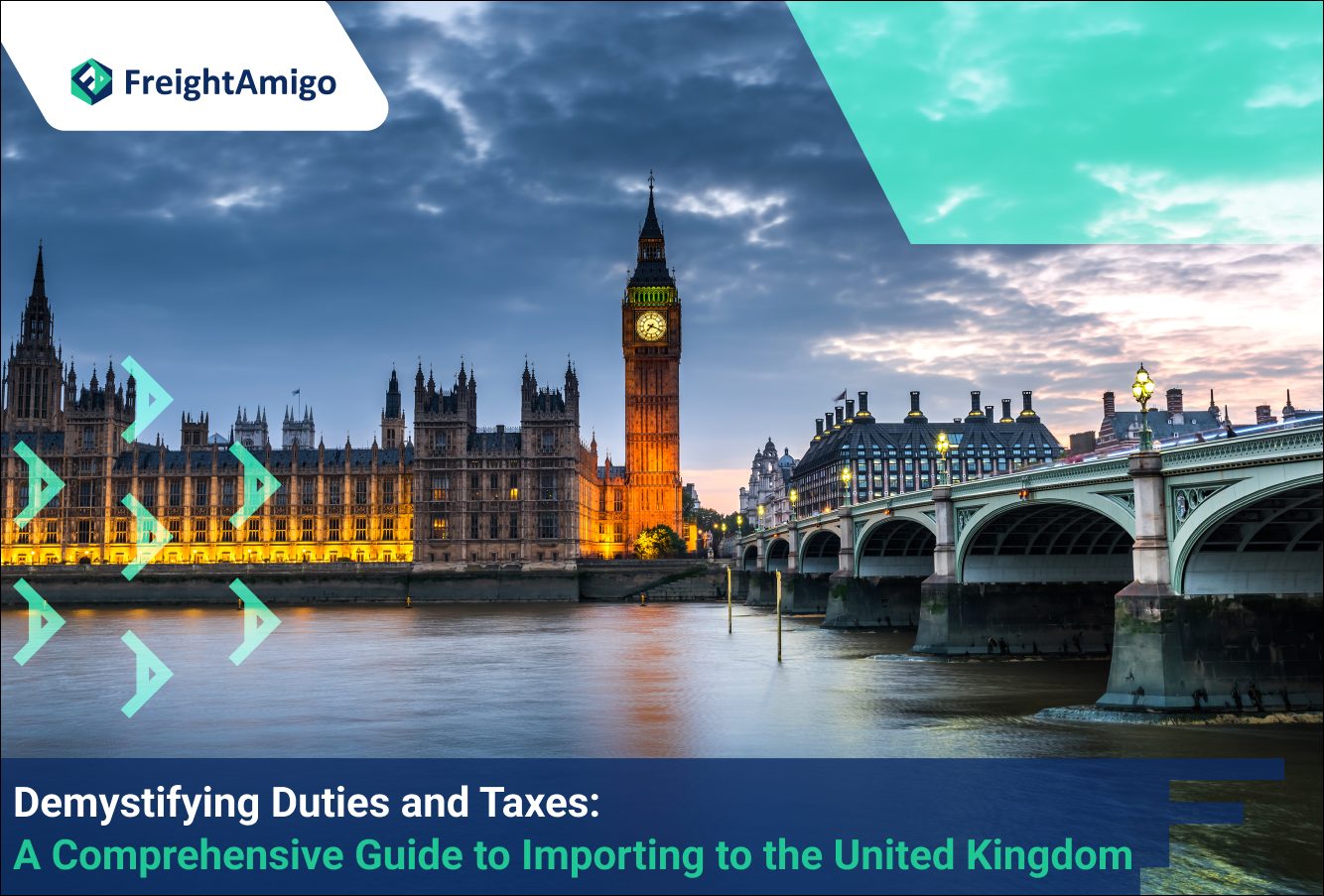Author Name: Tiffany Lee – Marketing Analyst at FreightAmigo
Navigating the complexities of UK import duty and the broader framework of importing goods into the United Kingdom represents a critical challenge for businesses aspiring to participate in the global marketplace. Understanding these duties and taxes is not merely a regulatory compliance issue but a significant determinant of a venture’s overall cost efficiency and market competitiveness.
FreightAmigo aims to provide a comprehensive overview of the key elements involved in importing to the UK in this guide, starting with the basics of UK import duty and taxes. Readers will gain insight into calculating import duties and value-added tax (VAT) for shipments to the UK, exploring strategies for managing and potentially reducing these import costs. Further, the article will delve into navigating the customs clearance process, offering invaluable advice for ensuring compliance and minimizing delays. Through addressing these critical areas, the guide seeks to equip businesses with the knowledge required to streamline their import operations, fostering growth and innovation in their international trade endeavors.
Want To Compare The Best Express, Air Freight, Sea Freight, Rail Freight & Trucking Rates So As To Have Better Control On Cost?
Understanding UK Import Duties and Taxes
Overview of Import Duties in the UK
Import duties in the United Kingdom are primarily regulated by Her Majesty’s Revenue and Customs (HMRC). These duties are applicable to imported goods valued above GBP 135. The rate of customs duties can range from 0% to 25% based on the value of the goods, with gifts between GBP 135 and GBP 630 incurring a rate of 2.5% or less. However, gifts exceeding GBP 630 are subject to higher rates determined by specific commodity codes. Additionally, imported goods typically attract a standard 20% VAT rate, with certain items like health products and child car seats taxed at a 5% VAT rate.
Differentiating between Customs Duties, VAT, and Excise Taxes
- Customs Duties: Charged on imported goods exceeding GBP 135 in value, with rates varying from 0% to 25%.
- Value Added Tax (VAT): A standard 20% VAT applies to imported goods, with reduced rates for specific categories.
- Excise Taxes: Imposed on specific goods such as alcohol and tobacco, with rates and imposition methods varying by category.
Anti-dumping duty and Excise Tax are two additional types of duties levied based on certain situations. Anti-dumping duty targets imported goods priced lower than similar products in the UK to protect local businesses from unfair competition. The rate of anti-dumping duty varies but can reach up to 50% of the goods’ value. Excise Tax applies exclusively to imported liquor and tobacco products.
Calculating Import Duties and VAT for Shipments to the UK
Determining the Taxable Value of Imported Goods
- Reference Shipping Agreement Terms: Initially, it’s essential to understand the terms specified in your shipping agreement to determine the correct calculation method for the taxable value of your imported goods.
- Identify Commodity Code: Next, locate your goods’ commodity code on the UK tariff trade site. This code is crucial as it dictates the applicable customs duty and VAT rates.
- Calculate CIF or FOB Value: Depending on your shipping agreement’s terms, calculate the CIF (Cost, Insurance, and Freight) or FOB (Freight On Board) value. For CIF, sum the value of goods with insurance and freight costs. For FOB, consider only the value of goods.
Applying the Correct Customs Duty and VAT Rates
- Multiplying by Customs Duty Rate: After determining the CIF or FOB value, multiply this figure by the customs duty rate provided on the UK tariff trade site. This calculation yields the customs duties due on your shipment.
- Calculating VAT: To calculate VAT, multiply the shipment value (CIF or FOB, based on your agreement) by the VAT rate also found on the UK tariff trade site. Remember, the standard VAT rate for imported goods is 20%, with certain goods attracting reduced rates.
- Incorporating Excise Taxes: If applicable, add any excise taxes to the total cost. Excise taxes are levied on specific goods such as alcohol and tobacco.
Strategies for Managing and Reducing Import Costs
To effectively manage and reduce import costs when importing goods into the United Kingdom, businesses can adopt several strategic approaches. These strategies not only help in minimizing expenses but also ensure compliance with UK import regulations.
Leveraging Free Trade Agreements and Preferential Tariffs
- Utilize Trade Tariff Tools: Begin by using the trade tariff tool to identify the correct commodity code for your goods. This step is crucial for determining applicable tariffs.
- Understand Rules of Origin: Verify that your goods are treated as originating from a country you’re importing from to claim a preferential rate of duty. This involves checking the rules of origin and ensuring your goods meet these criteria every time you claim a tariff preference.
- Maintain Required Documentation: Keep a copy of the import declaration, proof of origin, and supporting documents. These are necessary to support your claim for a preferential rate of duty.
Understanding Anti-Dumping Duty and How It Affects Imports
- Identify Applicable Duties: Determine if your product is subject to anti-dumping duty by checking its duty rating. Anti-dumping duties are imposed on goods sold below market value to protect domestic industries.
- Calculate the Impact: Understand how anti-dumping duties, in addition to other duties, affect the total cost of imports. This includes customs duty and VAT, which can significantly increase the import cost.
- Explore Exemptions: Investigate if there are exemptions or lower rates available for your products based on their origin or specific conditions. This can help avoid or reduce anti-dumping duties.
Options for Deferring or Reducing Import Tax Payments
- Apply for a Duty Deferment Account: This account allows importers to make one payment a month through Direct Debit instead of paying for individual consignments. It covers customs duty, excise duties, and import VAT.
- Account for Import VAT on VAT Return: If registered for VAT, account for your import VAT on your VAT Return, which can be an alternative to paying VAT by duty deferment.
- Utilize Guarantee Waivers and AEOC: To defer customs duty, excise duty, and import VAT, consider reducing financial guarantees by using a duty deferment account guarantee waiver or Authorized Economic Operator customs simplification (AEOC).
By adopting these strategies, businesses can navigate the complexities of UK import duty and taxes more effectively, leading to potential cost savings and a more streamlined import process.
The Role of Her Majesty’s Revenue and Customs (HMRC) in Enforcement
HMRC plays a crucial role in the customs declaration process and revenue collection for the UK, employing electronic systems like CHIEF and CDS to streamline customs declarations. The department is dedicated to promoting trade compliance and managing risks associated with cross-border trade, providing guidance on customs regulations. HMRC employs a risk-based approach to customs control, utilizing data analysis and intelligence sharing to identify potential risks and non-compliant behavior. Additionally, HMRC is responsible for implementing anti-dumping and countervailing duties (ADD/CVD) measures and monitoring risk assessment, with law enforcement investigating fraud and taking necessary criminal proceedings. The European Commission’s anti-fraud unit, OLAF, also plays a role in investigating duty avoidance, which can lead to duty demands being issued to importers.
Required Documentation for Import Clearance
- EORI Number: Essential for businesses importing goods into the UK. An EORI number starting with GB is required for imports into England, Wales, or Scotland, while goods moved to or from Northern Ireland may need an EORI starting with XI.
- Commodity Code: Determines the rate of duty and necessity for an import license. It must be included on the import declaration.
- Commercial Invoice and Packing List: Provides details about the goods, including type, quantity, and value, crucial for determining duty and VAT.
- Bill of Lading or Air Waybill: Acts as a receipt of goods and a contract between the shipper and carrier.
- Licenses or Certificates: Required for specific goods such as animals, plants, food, medicines, and weapons.
Role of Incoterms in Assigning Responsibility for Customs Obligations
Incoterms define the responsibilities, costs, and risks associated with the international transportation and delivery of goods. They clarify obligations for customs clearance, insurance, and transport costs, ensuring both parties understand their duties. For example, DDP (Delivered Duty Paid) places the maximum obligation on the seller, including duty and VAT payments, while EXW (Ex Works) minimizes the seller’s obligations. Proper use of Incoterms in contracts and shipping documentation is crucial for compliance and smooth customs clearance.
Importing Gifts and Personal Shipments: Special Considerations
Gifts sent to the UK may be subject to import VAT and customs duty, depending on their value. Gifts over £39 are liable for import VAT, and customs duty applies if the value exceeds £135. However, gifts of alcohol, tobacco, perfumes, and toilet waters have specific allowances and may qualify for relief from import duties and VAT if within specified limits. Multi-gift packages intended for several individuals can benefit from the £39 VAT relief per person, provided they meet certain conditions, such as being individually wrapped and addressed.
Navigating the customs clearance process in the UK requires careful attention to documentation, understanding of Incoterms, and awareness of special considerations for personal shipments and gifts. By adhering to these guidelines, businesses and individuals can ensure compliance and minimize potential delays or additional costs.
Conclusion
Through this comprehensive guide, FreightAmigo unraveled the intricacies of UK import duties, taxes, and the customs clearance process, presenting a clearer pathway for businesses aiming to enter the UK market effectively. By delving into calculating import duties and VAT, understanding various taxes including customs duties, VAT, and excise taxes, and exploring strategies for managing and mitigating these costs, the guide serves as an invaluable resource. It emphasizes not just compliance with UK regulations but also strategies for cost efficiency and market competitiveness, which are indispensable for thriving in international trade.
By leveraging the insights provided on optimizing import operations through the utilization of free trade agreements, understanding anti-dumping duties, and exploring tax deferral options, businesses are better positioned to navigate the complexities of the global marketplace. As international trade continues to evolve, the principles discussed here will remain pivotal for businesses looking to innovate, grow, and compete on a global scale.
There Are Different Options For Cargo Transportation. If You Want To Choose The Most Convenient And Suitable Solution, It Is Best To Have The Full Support Of Logistics Experts! If You Are Planning To Ship Goods Overseas, Please Go To The FreightAmigo Page For Inquiries.
===
Read More:
【Cosmetic Product Recycling】 A Guide to Sustainable Reverse Logistics
【Rise of Green Supply Chain】 Pioneering Sustainable Practices in Logistics
【ESG in Logistics】 How ESG Practices Drive Social Responsibility in Logistics
===
If you have any inquiries on logistics/supply chain, feel free to contact FreightAmigo now:
Chat with us online OR
Phone : +852 28121686
WhatsApp: +852 27467829









































